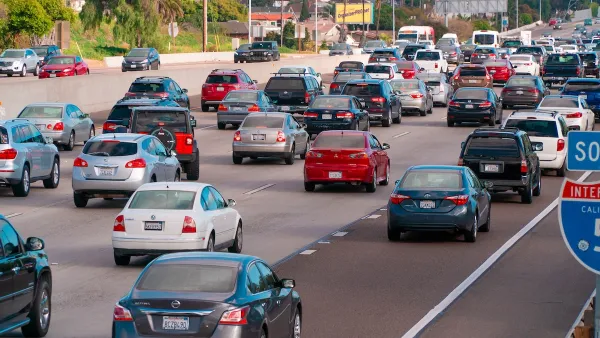Although transport planners consider traffic congestion economically harmful, economic productivity tends to increase with congestion and decline with increased road supply. This paradox can be explained by more nuanced analysis of accessibility.
If you think this sounds paradoxical, so does the study’s author, Todd Litman of the Victoria Transport Institute. But he also offers several reasons why it’s so.
For one thing, decisions to build roads or subsidize them by not charging users tends to come at the expense of other access options, things such as densification so people need not travel so far, or transit that provides more bang for the buck. These kinds of decisions are often based on politics, thus defying efficient market principles and undermining productivity.
As well, car travel is expensive. This means it increases costs borne by industry, and also sucks plenty of money from household budgets. Much of this money goes to car manufacturers outside the region or the country.
Litman concedes motor vehicle travel is economically important. “It delivers raw materials to producers, goods to markets, employees to work, students to schools, and customers to markets. All else being equal, an increase in transport system efficiency should increase productivity.”
However, cars and trucks aren’t the only aspects of transport systems, only the most visible and costly.
FULL STORY: Don Cayo: Congestion may signify better productivity, not worse

Analysis: Cybertruck Fatality Rate Far Exceeds That of Ford Pinto
The Tesla Cybertruck was recalled seven times last year.

National Parks Layoffs Will Cause Communities to Lose Billions
Thousands of essential park workers were laid off this week, just before the busy spring break season.

Retro-silient?: America’s First “Eco-burb,” The Woodlands Turns 50
A master-planned community north of Houston offers lessons on green infrastructure and resilient design, but falls short of its founder’s lofty affordability and walkability goals.

Test News Post 1
This is a summary

Analysis: Cybertruck Fatality Rate Far Exceeds That of Ford Pinto
The Tesla Cybertruck was recalled seven times last year.

Test News Headline 46
Test for the image on the front page.
Urban Design for Planners 1: Software Tools
This six-course series explores essential urban design concepts using open source software and equips planners with the tools they need to participate fully in the urban design process.
Planning for Universal Design
Learn the tools for implementing Universal Design in planning regulations.
EMC Planning Group, Inc.
Planetizen
Planetizen
Mpact (formerly Rail~Volution)
Great Falls Development Authority, Inc.
HUDs Office of Policy Development and Research
NYU Wagner Graduate School of Public Service



























